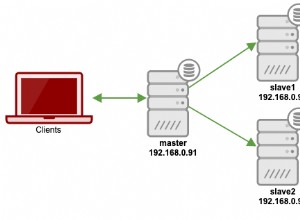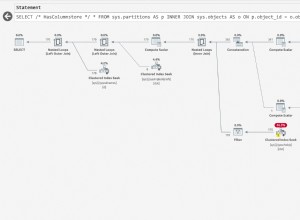Hai detto che non hai scritto alcun codice, quindi ho deciso di mostrarti come ho creato il nuovo Play! 2.2 applicazione utilizzando JPA e Postgresql. Puoi fare lo stesso e verificare la differenza.
Per prima cosa ho creato una nuova applicazione Play con il comando:
play new testApp
Quindi ho creato il file persistence.xml nella directory testApp/conf/META-INF e l'ho riempito con il contenuto:
<persistence xmlns="https://java.sun.com/xml/ns/persistence"
xmlns:xsi="https://www.w3.org/2001/XMLSchema-instance"
xsi:schemaLocation="https://java.sun.com/xml/ns/persistence https://java.sun.com/xml/ns/persistence/persistence_2_0.xsd"
version="2.0">
<persistence-unit name="defaultPersistenceUnit" transaction-type="RESOURCE_LOCAL">
<provider>org.hibernate.ejb.HibernatePersistence</provider>
<non-jta-data-source>DefaultDS</non-jta-data-source>
<properties>
<property name="hibernate.dialect" value="org.hibernate.dialect.PostgreSQLDialect"/>
<!--<property name="hibernate.show_sql" value="true"/>-->
<property name="hibernate.hbm2ddl.auto" value="update"/>
<property name="hibernate.format_sql" value="true"/>
</properties>
</persistence-unit>
Aggiunto al mio testApp/conf/application.conf:
jpa.default=defaultPersistenceUnit
db.default.driver=org.postgresql.Driver
db.default.url="postgres://postgres:example@sqldat.com/test"
# You can expose this datasource via JNDI if needed (Useful for JPA)
db.default.jndiName=DefaultDS
Ho anche creato una classe modello di esempio:
@Entity
@SequenceGenerator(name = "Token_generator", sequenceName = "test_sequence", allocationSize = 1, initialValue = 1)
public class Test {
@Id
@GeneratedValue(strategy = GenerationType.SEQUENCE, generator = "Token_generator")
public Long id;
public String name;
}
Ho iniziato a giocare all'app con il comando:
play ~run
Quindi sono stato in grado di vedere il sito Web funzionante sotto https://localhost:9000/ address. Sono stato anche in grado di vedere il nuovo test di tabella nel database di test di Postgres.




